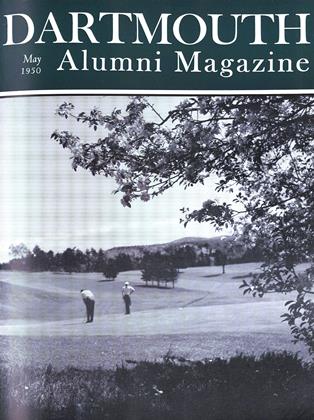FOR the first time since the war, the College last month awarded Senior Fellowships for independent, individual study. President Dickey announced the names of ten members of the Class of 1951 who will take up chosen projects for specialized work beginning next fall. The recipients, who must meet outstanding requirements of scholarship and responsibility, are: Robert Caterson of Bridgeport, Conn.; Stephen M. Cohen of Long Beach, N. Y.; Russell C. Dilks of Glenside, Pa.; Edward L. Glaser of Glencoe, Ill.; Howard A. Glickstein of New York, N. Y.; Orlando S. Hobbs of North Brentwood, Md.; Edward C. Lathem of Bethlehem, N. H.; Lloyd A. Richardson of Detroit. Mich.; Harold M. Stahmer Jr. of Brooklyn, N. Y.; and Edward P. Tolley Jr. ot Geneva, Ill.
According to the terms of the awards, originally established in 1929, Senior Fellows will be given "all the freedom are capable of using profitably within the framework, but not necessarily within the conventional curriculum, of the four-year undergraduate College." Each Fellow Will follow his own independent course study with the aid of a faculty adviser. some cases he may be excused from regular classes except the Great issues Course.
At present a major in English, Caterson plans to use his fellowship to study Byron's ideas and influences on Roman Literature in the Western World. A graduate of Warren Harding High School, Bridgeport, he was in the Second Ho Group last year.
A philosophy major, Cohen intends to explore the general problem of values, which he believes is the crucial proD facing modern philosophy. A former member of the Undergraduate Council and editor of the Dartmouth Quarterly, he entered college from Long Beach, N. Y., High School.
Dilks' fellowship program will be a study of the precursors of the Symbolist Movement in three fields: English-American literature, music, and philosophy. An English honors student and a Rufus Choate Scholar for the past two years, he has been on the junior newsboard of TheDartmouth, a senior editor of the Dartmouth Quarterly, and a member of the Forensic Union. He won the Lockwood Debating Prize in 1949. He is a graduate of Abington, Pa., Senior High School.
Glaser, a blind student, plans a comprehensive study of the blind student in American colleges and universities. A physics major, he took first prize in the Thayer Mathematical Prize Contest last year. He prepared for college at the North Shore Country Day School, Winnetka, Ill.
Glickstein intends to study majorityminority problems, with emphasis on a study of the attempts of majorities to deny the rights of minorities. A history major, he was founder and first president of the Dartmouth Human Rights Society. A graduate of DeWitt Clinton High School, New York City, he was a Rufus Choate Scholar last year.
An English major, Hobbs will use his fellowship to study the history of the English language. In the Third Honors Group for 1948-49, he has been a member of the Forensic Union and the literary board of the Dartmouth Quarterly. He is a graduate of Dunbar High School, Washington, D. C.
Lathem expects to write a historical account and bibliography of the Dartmouth College Case. An English honors student, he was in the Second Honors Group last year. Lathem prepared for college at the Technical High School, Springfield, Mass.
Also an English major, Richardson will study certain Elizabethan plays, aiming at a dramatic and literary criticism of them and planning to evaluate them as fresh and vital material for the theater. In the Second Honors Group last year, he is an alumnus of Cranbrook School, Birmingham, Mich.
Stahmer's study program includes the problems facing the industrial worker, especially in his relation to organized religion. A graduate of Brooklyn Technical High School, he is a member of the rifle team and is active in the Dartmouth Christian Union. He is a philosophy major.
As an English major, Tolley will study the intellectual climate of contemporary America through the materials, methods, philosophy, and purposes contained in the writings of several leading literary critics. A member of the Second Honors Group in 1948-49, he has played both freshman and junior varsity football. Tolley prepared for college at the Glenbard Township High School, Glenn Ellyn, Ill.
 View Full Issue
View Full Issue
More From This Issue
-
 Article
ArticleWDBS
May 1950 By DICK T. HOLLANDS '50 -
 Class Notes
Class Notes1917
May 1950 By KARL W. KOENICER, DONALD BROOKS, HOWARD A. STOCKWELL -
 Class Notes
Class Notes1918
May 1950 By ERNEST H. EARLEY, DONALD L. BARR, RICHARD A. HOLTON -
 Class Notes
Class Notes1923
May 1950 By TRUMAN T. METZEL, COLIN C. STEWART 3RD, LEON H. YOUNG JR. -
 Class Notes
Class Notes1905
May 1950 By ROYAL PARKINSON, GILBERT H. FALL, FLETCHER A. HATCH -
 Class Notes
Class Notes1929
May 1950 By F. WILLIAM ANDRES, EDWIN C. CHINLUND, GEORGE B. REDDING








